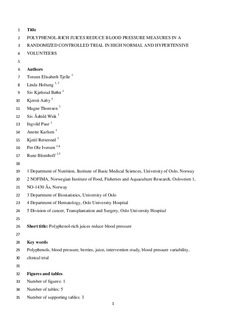| dc.contributor.author | Tjelle, Torunn Elisabeth | |
| dc.contributor.author | Holtung, Linda | |
| dc.contributor.author | Bøhn, Siv Kjølsrud | |
| dc.contributor.author | Aaby, Kjersti | |
| dc.contributor.author | Thoresen, Magne | |
| dc.contributor.author | Wiik, Siv Åshild | |
| dc.contributor.author | Paur, Ingvild | |
| dc.contributor.author | Karlsen, Anette Solli | |
| dc.contributor.author | Retterstøl, Kjetil | |
| dc.contributor.author | Iversen, Per Ole | |
| dc.contributor.author | Blomhoff, Rune | |
| dc.date.accessioned | 2018-06-27T11:22:16Z | |
| dc.date.available | 2018-06-27T11:22:16Z | |
| dc.date.created | 2015-09-01T12:43:40Z | |
| dc.date.issued | 2015 | |
| dc.identifier.citation | British Journal of Nutrition. 2015, 114 (7), 1054-1063. | |
| dc.identifier.issn | 0007-1145 | |
| dc.identifier.uri | http://hdl.handle.net/11250/2503269 | |
| dc.description.abstract | Intake of fruits and berries may lower blood pressure (BP), most probably due to the high content of polyphenols. In the present study, we tested whether consumption of two polyphenol-rich juices could lower BP. In a randomised, double-blinded, placebo-controlled trial of 12 weeks, 134 healthy individuals, aged 50–70 years, with high normal range BP (130/85–139/89 mmHg, seventy-two subjects) or stage 1-2 hypertension (140/90–179/109 mmHg, sixty-two subjects), were included. They consumed 500 ml/d of one of either (1) a commercially available polyphenol-rich juice based on red grapes, cherries, chokeberries and bilberries; (2) a juice similar to (1) but enriched With polyphenol-rich extracts from blackcurrant press-residue or (3) a placebo juice (polyphenol contents 245·5, 305·2 and 76 mg/100 g, respectively). Resting BP was measured three times, with a 1 min interval, at baseline and after 6 and 12 weeks of intervention. Systolic BP significantly reduced over time (6 and 12 weeks, respectively) in the pooled juice group compared with the placebo group in the first of the three measurements, both for the whole study group (6·9 and 3·4 mmHg; P¼0·01) and even more pronounced in the hypertensive subjects when analysed separately (7·3 and 6·8 mmHg; P¼0·04). The variation in the BP measurements was significantly reduced in the pooled juice group compared with the placebo group (1·4 and 1·7 mmHg; P¼0·03). In conclusion, the present findings suggest that polyphenol-rich berry juice may contribute to a BP- and BP variability lowering effect, being more pronounced in hypertensive than in normotensive subjects. | |
| dc.description.abstract | Polyphenol-rich juices reduce blood pressure measures in a randomised controlled trial in high normal and hypertensive volunteers | |
| dc.language.iso | eng | |
| dc.title | Polyphenol-rich juices reduce blood pressure measures in a randomised controlled trial in high normal and hypertensive volunteers | |
| dc.title.alternative | Polyphenol-rich juices reduce blood pressure measures in a randomised controlled trial in high normal and hypertensive volunteers | |
| dc.type | Peer reviewed | |
| dc.type | Journal article | |
| dc.description.version | submittedVersion | |
| dc.source.pagenumber | 1054-1063 | |
| dc.source.volume | 114 | |
| dc.source.journal | British Journal of Nutrition | |
| dc.source.issue | 7 | |
| dc.identifier.doi | 10.1017/S0007114515000562 | |
| dc.identifier.cristin | 1261215 | |
| dc.relation.project | Norges forskningsråd: 186902 | |
| dc.relation.project | Nofima AS: 3566 | |
| dc.relation.project | Norges forskningsråd: 224892 | |
| dc.relation.project | Nofima AS: 201303 | |
| cristin.unitcode | 7543,3,1,0 | |
| cristin.unitname | Mat og helse | |
| cristin.ispublished | true | |
| cristin.fulltext | preprint | |
| cristin.qualitycode | 1 | |
